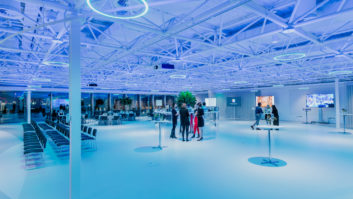
Osram UK research reveals consumers’ reluctance to conserve energy.
Despite nine in ten Brits claiming they understand the implications that changing the lighting in their home can have on energy bills, only a third switched off their lights in support of Earth Hour, according to a survey from lighting giant Osram.
With 5% of global CO2 emissions attributable to electric light sources, 85% of those surveyed admit they don’t regularly switch off their lights, together with 84% saying they don’t use energy efficient products to minimise their impact on climate change. However, in spite of this reluctance to conserve light, over three-quarters of Brits maintain they are worried about the effects of light pollution, with energy wastage their top concern (41%).
The survey, commissioned by Osram, questioned over 600 UK consumers on their attitudes towards the impact of lighting on climate change ahead of Earth Hour at the end of March.
First observed as a lights-off event in Sydney, Earth Hour is a global campaign first introduced by the World Wildlife Fund (WWF) in 2007 to raise awareness about climate change. Participants across 154 countries in 7 continents turned off their lights at 8.30pm on 29 March.
In addition to supporting Earth Hour, Osram is dedicated to offering products and processes that address a number of global sustainability challenges affecting society and the environment through its Global Care programme. For example, through its Off Grid lighting programme, Osram has replaced kerosene lamps for 175,000 fishermen in Kenya with rechargeable battery-operated lamps upon which they depend when working in darkness on Lake Victoria (pictured).
“It’s disappointing to see that turning off lights in our home is still not second nature to us, like recycling, which over half of us (57%) are still committed to, for example. Awareness of climate change and the importance of conserving energy through more efficient lighting is high, but many of us are failing to commit to protecting our planet through simple measures,” says Rune Marki, managing director of Osram UK.
As well as turning the lights off and controlling light, investing in energy efficient lighting brings recognisable paybacks in energy consumption. With old and inefficient incandescent light bulbs banned, consumers can make an informed choice about the lighting in their home. The latest LED technology is growing in demand and brings greater flexibility with its instant light, choices of light colour and long lifetimes.
“We’re spoilt in the developed world – we can switch lights on whenever we need to, but don’t appreciate the consequences our reliance on light will have on our limited energy resources. Astoundingly, 1.3 billion people across the globe still don’t have the luxury of a national power grid but rely on light for their livelihood – such a stark contrast to how we view and treat artificial light,” continues Marki.







